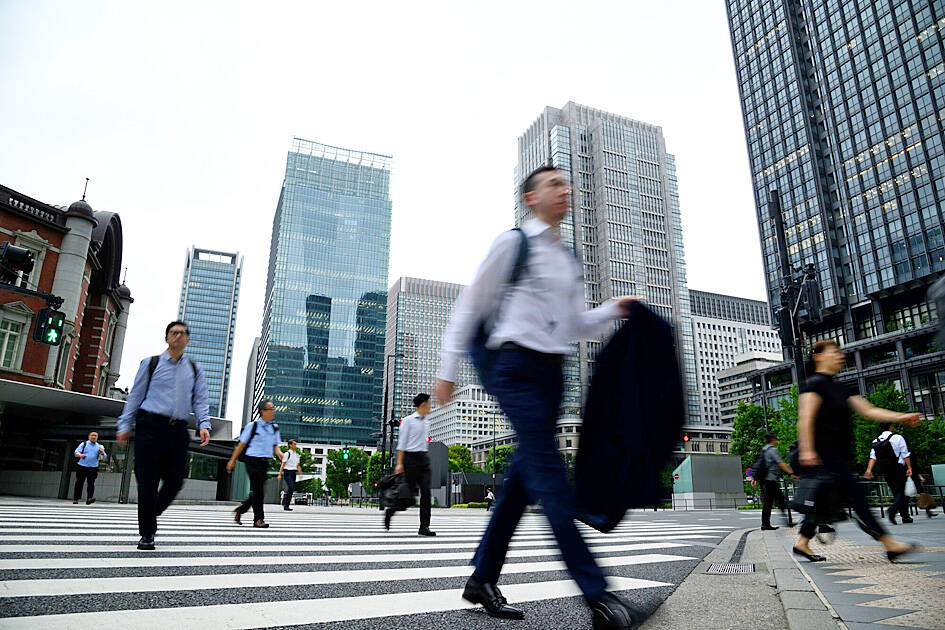Japan’s economy expanded in the second quarter at a pace slightly slower than the government’s initial estimate, while still advancing enough to keep the Bank of Japan (BOJ) on track to raise interest rates later this year.
Japan’s GDP grew at an annualized pace of 2.9 percent in the three months through June compared with the previous quarter, the Japanese Cabinet Office said yesterday.
The result compared with a preliminary estimate of 3.1 percent. Private consumption and capital investment were both revised a tad lower.

Photo: Bloomberg
In non-inflation adjusted terms, the economy advanced 1.8 percent from the previous quarter, and the data reaffirmed that the total value of the economy exceeded ¥600 trillion (US$4.18 trillion) for the first time on record, a goal set a decade ago by policymakers.
While the key domestic demand components were slightly downgraded, the overall results broadly support BOJ Governor Kazuo Ueda’s view that a gradual recovery would continue.
The central bank would conclude its next policy meeting on Friday next week, with the focus likely to fall on the prospects for another rate increase next month or in December after the latest hike to 0.25 percent in July.
Yesterday’s data confirmed that consumer spending grew 0.9 percent from the previous quarter in a sign of a recovery after it fell for four consecutive quarters through the end of March.
Concerns over cost of living and consumer demand would be on the minds of politicians vying to become Japan’s next prime minister. The ruling Liberal Democratic Party’s (LDP) Sept. 27 leadership election is all but certain to determine Japanese Prime Minister Fumio Kishida’s successor due to the party’s dominance in parliament.
LDP Secretary-General Toshimitsu Motegi, one of several candidates running in the party race, last week said he would compile an economic package if he wins the vote.
Shinjiro Koizumi, one of the frontrunners in the leadership race, has also pledged to unveil a package should he become prime minister.
With the likelihood that demand from China and the US might cool as economic growth slows, Japan’s consumer spending would be critical going forward, Norinchukin Research Institute chief economist Takeshi Minami said.
“Consumer spending may get stronger as wages are starting to rise,” he said. “At the same time, a recent rise in prices for rice and food may keep households in a saving mode.”

When an apartment comes up for rent in Germany’s big cities, hundreds of prospective tenants often queue down the street to view it, but the acute shortage of affordable housing is getting scant attention ahead of today’s snap general election. “Housing is one of the main problems for people, but nobody talks about it, nobody takes it seriously,” said Andreas Ibel, president of Build Europe, an association representing housing developers. Migration and the sluggish economy top the list of voters’ concerns, but analysts say housing policy fails to break through as returns on investment take time to register, making the

‘SILVER LINING’: Although the news caused TSMC to fall on the local market, an analyst said that as tariffs are not set to go into effect until April, there is still time for negotiations US President Donald Trump on Tuesday said that he would likely impose tariffs on semiconductor, automobile and pharmaceutical imports of about 25 percent, with an announcement coming as soon as April 2 in a move that would represent a dramatic widening of the US leader’s trade war. “I probably will tell you that on April 2, but it’ll be in the neighborhood of 25 percent,” Trump told reporters at his Mar-a-Lago club when asked about his plan for auto tariffs. Asked about similar levies on pharmaceutical drugs and semiconductors, the president said that “it’ll be 25 percent and higher, and it’ll

CHIP BOOM: Revenue for the semiconductor industry is set to reach US$1 trillion by 2032, opening up opportunities for the chip pacakging and testing company, it said ASE Technology Holding Co (日月光投控), the world’s largest provider of outsourced semiconductor assembly and test (OSAT) services, yesterday launched a new advanced manufacturing facility in Penang, Malaysia, aiming to meet growing demand for emerging technologies such as generative artificial intelligence (AI) applications. The US$300 million facility is a critical step in expanding ASE’s global footprint, offering an alternative for customers from the US, Europe, Japan, South Korea and China to assemble and test chips outside of Taiwan amid efforts to diversify supply chains. The plant, the company’s fifth in Malaysia, is part of a strategic expansion plan that would more than triple

Taiwanese artificial intelligence (AI) server makers are expected to make major investments in Texas in May after US President Donald Trump’s first 100 days in office and amid his rising tariff threats, Taiwan Electrical and Electronic Manufacturers’ Association (TEEMA, 台灣電子電機公會) chairman Richard Lee (李詩欽) said yesterday. The association led a delegation of seven AI server manufacturers to Washington, as well as the US states of California, Texas and New Mexico, to discuss land and tax issues, as Taiwanese firms speed up their production plans in the US with many of them seeing Texas as their top option for investment, Lee said. The